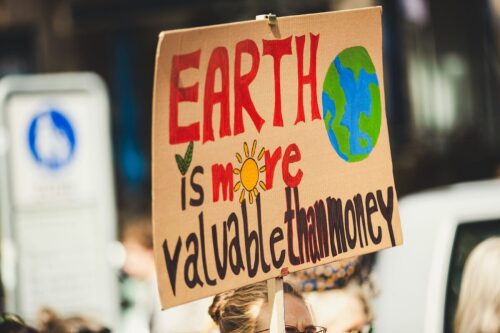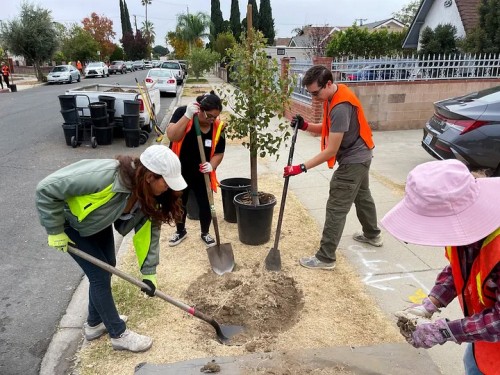Greening America’s Cities: Advancing Urban Greening in Underserved US Communities
The Bezos Earth Fund’s Greening America’s Cities initiative is a $400 million commitment to build parks, plant trees, and develop green spaces and community gardens within urban centers.
As part of Community Partners ’mission to build a more equitable, thriving, and inclusive society, a strong focus has been on supporting climate resilience and sustainability throughout Los Angeles County, especially in underserved communities. In the spring of 2024, the Bezos Earth Fund partnered with the Community Partners ’Intermediary Team, led by Phyllis Owens, Vice President of Intermediary and Strategic Partnerships to provide support for Greening America’s Cities ’first cohort of grantees.
While the effects of rising temperatures, air pollution, and extreme weather events are felt across the region, immigrant communities often bear a disproportionately heavy burden. This vulnerability is compounded by a critical challenge: much of the information about these issues, and community-based solutions, is primarily disseminated through mainstream English-speaking media, leaving many residents uninformed. The Greening America’s Cities initiative awarded a grant to UCLA’s Laboratory for Environmental Narrative Strategies (LENS) and Ethnic Media Services to mobilize a network of more than 40 ethnic media journalists to disseminate vital information about climate change and urban greening initiatives.
The journalists working with LENS will produce approximately 160 stories delving into a range of topics related to urban greening and environmental issues — everything from access to green spaces and community gardens to the effects of urban heat islands and the equitable distribution of environmental resources. All news stories will be translated into diverse languages and published through appropriate media outlets reaching predominantly non-English speaking households and communities of color.
“A recent UCLA study found that if Los Angeles communities that currently have poor tree canopy cover and access to neighborhood parks were brought up to just the median tree cover and park acreage, residents would enjoy close to one million years of additional life expectancy. This is a matter of life and death,” said Jon Christensen, Adjunct Assistant Professor
UCLA, Laboratory for Environmental Narrative Strategies (LENS). “We are working with dozens of ethnic media journalists to support their coverage of these issues to ensure that urban greening projects benefit their communities and have adequate sustained funding to provide durable green amenities — for shade, recreation, food production, and other benefits. Ultimately, this initiative is about more than just planting trees and creating green spaces. It’s about ensuring that the benefits of urban greening are shared equitably across LA’s diverse communities.”
The urban heat island effect, caused by vast expanses of concrete and asphalt absorbing and radiating heat, makes cities significantly hotter than their surrounding rural areas. This phenomenon is particularly pronounced in Los Angeles in low-income neighborhoods and communities of color. These areas often lack adequate green space, parks, and, crucially, tree cover. The absence of trees translates directly to higher temperatures, increased energy consumption for cooling, and exacerbated health issues like heatstroke and respiratory problems. Ethnic Media Services recently shared a spotlight on a local tree canopy effort, supported by Greening America’s Cities. In defense against climate change and a catalyst for environmental justice, over 4,000 trees will be planted in the San Fernando Valley, in primarily low-income Latino neighborhoods in need of urban greening and planning.
The road to climate justice in Los Angeles is long and complex. Thanks to powerful coalitions and partnerships such as the Greening America’s Cities initiative, UCLA-LENS, and Ethnic Media Services, sharing information about local efforts to mitigate the impacts of climate change among a broad range of audiences is critical to involve the communities most affected by environmental inequalities. “Delivering well-informed coverage of urban greening opportunities and challenges is helping inform LA’s diverse communities how they can be involved in shaping positive outcomes through advocacy and volunteerism. The future for families and communities can be secure, enjoying the benefits of urban greening and thriving in a place without fear of being displaced by green gentrification,” said Christensen.
Learn more about Ethnic Media Services Greening Communities.
Join our mailing list!
Keep up on the latest from Community Partners—our partnerships, learnings, grant opportunities, resources and more.




